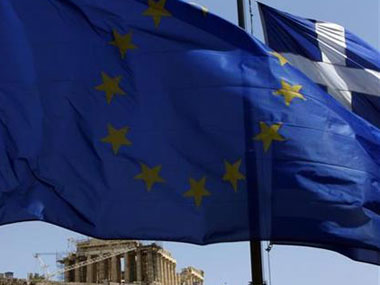Greece’s pro-bailout, pro-euro New Democracy Party emerged victorious on Sunday, indicating the Greeks will to stay anchored with the euro and remain an integral part of the euro zone.
Along with the socialist party Pasok, the New Democracy is likely to form a coalition soon. This means that there is near term certainty about Greece staying within the eurozone. However, far left party Syriza came very close in the polls and could be a strong opposition to the austerity measures.
Antonis Samaras, the leader of the New Democracy party which won the most votes in Sunday’s election, told CNBC that investors should be reassured by his parties victory over radical leftist Syriza party.
[caption id=“attachment_347156” align=“alignleft” width=“380” caption=“Along with the socialist party Pasok, the New Democracy is likely to form a coalition soon. Reuters”]  [/caption]
“What is happening today is we made sure with the vote of the Greek people that we are anchored within the euro; that we believe Europe can stand together with Greece, with every country that believes in the European orientation, as we do as the Greek people do,” he said.
Samaras said it is important that the new government do its best to boost social cohesion and development while honoring his countries commitments.
Meanwhile the eurozone finance ministers said in a statement on Sunday they would help Greece transform its economy and that continued fiscal and structural reforms were the best way for Athens to cope with its economic challenges.
“The eurogroup acknowledges the considerable efforts already made by the Greek citizens and is convinced that continued fiscal and structural reforms are Greece’s best guarantee to overcome the current economic and social challenges and for a more prosperous future of Greece in the euro area,” the statement said.
With the risk of a Greek exit from the euro zone fading, most assets have got a leg up overnight. The euro jumped to a one-month high and Asian shares rose on Monday after Greece’s cliffhanger election delivered a slim parliamentary majority to pro-bailout parties, a result seen as crucial to European leaders’ efforts to hold the euro together.
US stock index futures and riskier commodities such as crude oil also rose, while gold fell after having gained for the past six sessions, when investors had looked to bullion as a safe haven amid fears the election could result in financial turmoil.
“There’ll be a definite sense of relief spreading around today,” said Masayuki Doshida, senior market analyst at Rakuten Securities. “The question is whether there will be a sustained rebound as there’s still so many things to sort out - the euro zone’s fiscal problems and Spanish banks.”
With around 97% of the vote counted, the Greek election looked set to deliver a government led by conservative New Democracy, heading a coalition broadly committed to a 130 billion euro EU/IMF bailout.
Financial markets had feared a victory for SYRIZA, the radical leftists opposed to the austerity package of job, wage and pension cuts that are a condition of the bailout, without which Greece would be bankrupt.
MSCI’s broadest index of Asia Pacific shares outside Japan rose 0.7% and Tokyo’s Nikkei share average opened up 1.8%. US S&P 500 futures were trading around 0.5% higher.
The euro was up around 0.7% at about $1.2720, having climbed as far as $1.2748, its highest level in a month. The US dollar index eased 0.4%.
US crude rose 1% to around $84.85 a barrel and safe-haven assets retreated, with gold down 0.8% around $1,615 an ounce and benchmark US Treasury 10-year yields rising to around 1.64% from about 1.586%.
Hurdles remain
As well as cheering investors, the Greek election result should also come as a relief for world leaders who are due to kick off a G20 meeting in Mexico on Monday.
A statement from the Group of Seven major industrialised nations said it was in “all our interests” for Greece to remain in the eur zone while respecting its international bailout commitments.
But analysts warned there were still plenty of hurdles ahead and the initial positive market reaction could prove to be short-lived.
Wilbur Ross, the billionaire investor and Chairman of private equity firm, WL Ross and Co, feels the real question facing Greece is what policies the new government will implement after the pro-bailout New Democracy party won the most votes in Sunday’s vote. Greek government still faces a huge gap between its liabilities and revenues and the country risks running out of cash.
According to Ross, the government should prioritize selling off state assets such as real estate and government-owned companies, a move that wouldn’t be as unpopular as austerity measures, which have hurt incomes and employment.
Sebastian Galy, strategist at Societe Generale in New York, said the vote still left the Greek economy in crisis, with Spain, where the banking system is in crisis, not far behind it.
“Short-covering is well and good but will long-term investors decide that the crisis is over and move back into peripheral countries’ debt, or equities? We fear that is highly unlikely.”
Galy said more political and structural change was needed to shore up the euro zone’s financial system, and a growth plan was urgently required as well.
“The bottom line is that Europe still needs to agree on something that smells and feels a lot more like joint funding than anything that has been suggested so far.”
With inputs from AGENCIES


)
)
)
)
)
)
)
)
)



